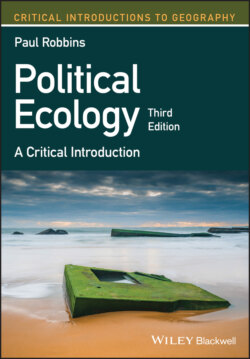Читать книгу Political Ecology - Paul Robbins - Страница 29
Chapter 2 A Tree with Deep Roots
ОглавлениеThe Determinist Context
The Building Blocks
Peter Alexeivich Kropotkin was born a Russian aristocrat in 1842, but by the time he died in 1921 he had become a globally known anarchist philosopher whose writings had done as much to explore the linkage between people and the environment as any in that tumultuous century. As an activist, a keen observer of nature, and a scientific explorer and ethnographer, Kropotkin was an early political ecologist.
As a geographer, Kropotkin set out in 1865 to explore the most remote areas of the Russian Far East where the Sayan highlands border Manchuria. There were no charts of the region at this time and in preparing for the expedition he came across a map prepared by a Tungus hunter with the point of a knife on tree bark. “This little map,” the explorer explained, “so struck me by its seeming truth to nature that I fully trusted to it” (Woodcock and Avakumovic 1990, p. 72). This trust for the environmental knowledge of local people was reinforced throughout his journey. Traveling for months with a local Yakut man, Kropotkin traversed 800 miles of rugged mountains. During his journey he encountered and described farmers, herders, and hunters who all organized their lives to thrive under what urban Russians would have considered unthinkably adverse conditions.
Like his previous expeditions, this arduous trip reinforced his growing appreciation for “the constructive work of the unknown masses, which so seldom finds any mention in books, and the importance of that constructive work in the growth of forms of society” (Woodcock and Avakumovic 1990, pp. 59–60). The evidence amassed during these journeys, of plants, people, and animals making a living from the land, convinced Kropotkin, moreover, that the survival and evolution of species is propelled by collective mutual aid, cooperation, and organization between individuals.
